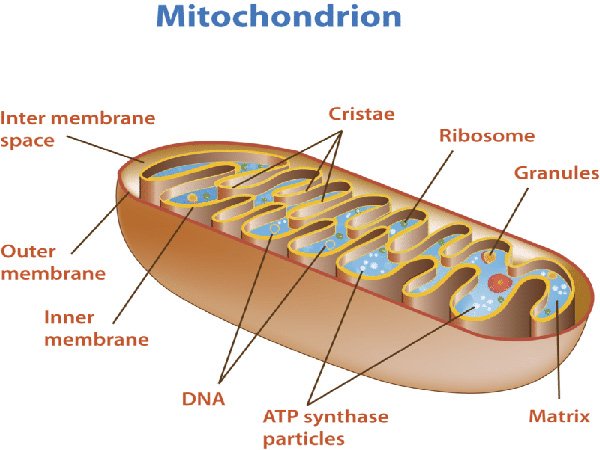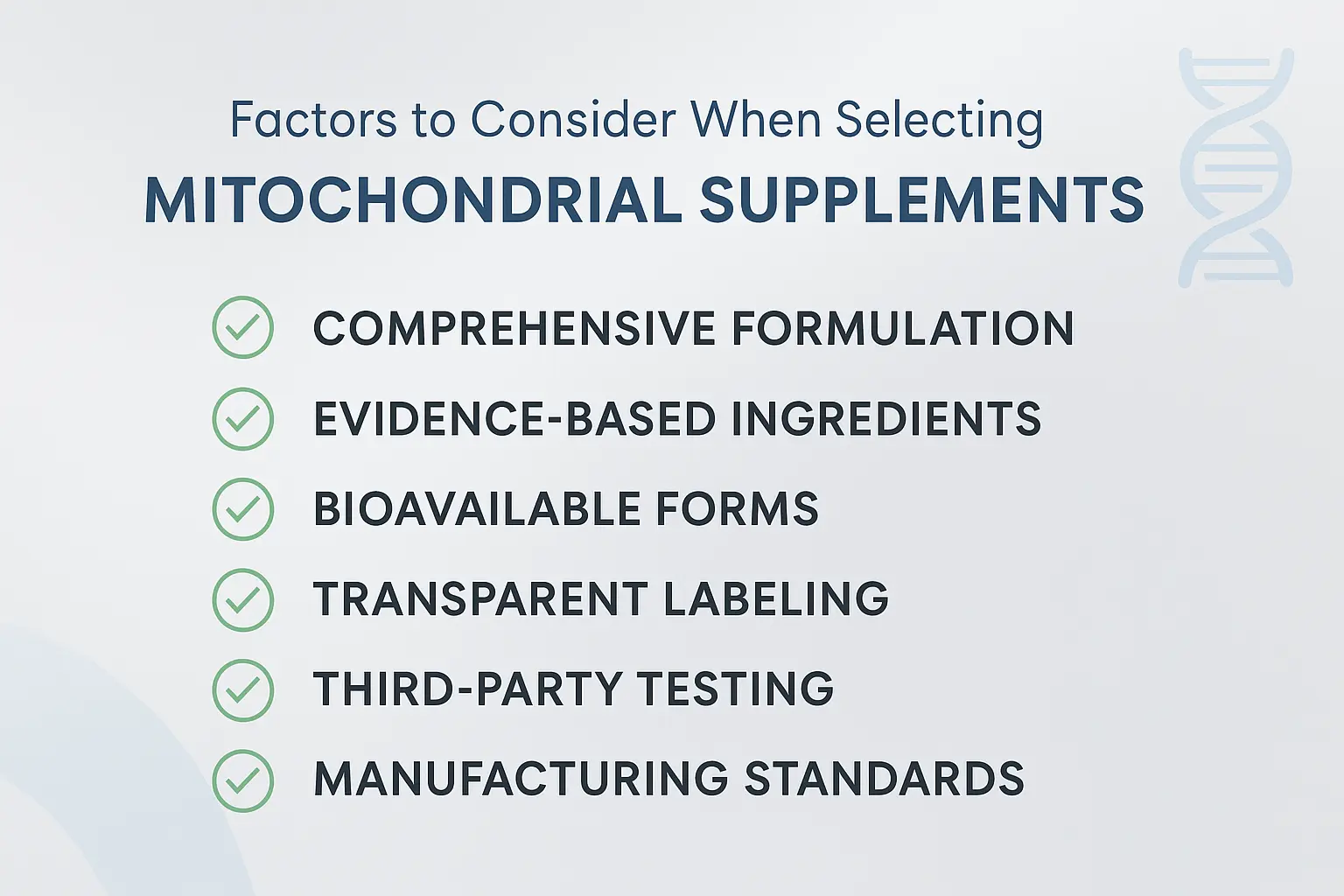Physical Address
1317 Edgewater Dr #3455
Orlando, FL 32804
Physical Address
1317 Edgewater Dr #3455
Orlando, FL 32804

“Mitochondrial health supplements target the cellular powerhouses responsible for 90% of your body’s energy production”
Mitochondrial health supplements offer a targeted approach to supporting these cellular powerhouses, potentially enhancing energy production, reducing oxidative stress, and supporting overall cellular function. Products like Advanced Mitochondrial Formula represents comprehensive approaches that combine multiple evidence-based ingredients for synergistic support. This comprehensive guide explores the science behind mitochondrial health supplements, their benefits, and evidence-based strategies to enhance cellular energy production.
Fundamentally, mitochondria function as miniature power plants within nearly every cell in your body. These remarkable organelles convert the food we eat and the oxygen we breathe into adenosine triphosphate (ATP). The universal energy currency that fuels everything from basic cellular maintenance to high-intensity physical activity. The process, known as oxidative phosphorylation, occurs along the inner mitochondrial membrane through a series of protein complexes collectively called the electron transport chain.
Interestingly, what makes mitochondria particularly fascinating is their unique evolutionary history. According to the endosymbiotic theory, mitochondria were once free-living bacteria that formed a symbiotic relationship with primitive cells billions of years ago. This ancient partnership explains why mitochondria have their own DNA (mitochondrial DNA or mtDNA) separate from the cell’s nuclear DNA. This distinctive genetic material makes mitochondria particularly vulnerable to damage and dysfunction. It also creates specific opportunities for targeted support through mitochondrial health supplements.
As a result, the density of mitochondria varies dramatically between different tissues, reflecting their energy demands. Heart muscle cells may contain up to 5,000 mitochondria per cell, while less metabolically active cells might contain only a few hundred. This concentration highlights why energy-intensive organs like the heart, brain, and muscles are particularly dependent on optimal mitochondrial function. And why these systems often show the earliest and most pronounced symptoms when mitochondrial health declines.

Unfortunately, several factors contribute to declining mitochondrial function as we age:
1. Oxidative Damage: Mitochondria generate reactive oxygen species (ROS) as a byproduct of energy production. While some ROS serve as important signaling molecules, excessive amounts damage mitochondrial components. Therefore, their DNA lacks the sophisticated repair mechanisms of nuclear DNA.
2. Reduced Biogenesis: The creation of new mitochondria (mitochondrial biogenesis) naturally slows with age, also leading to fewer functional mitochondria overall.
3. Decreased Enzyme Activity: Key enzymes involved in the electron transport chain become less efficient over time, reducing energy production capacity.
4. Membrane Deterioration: The specialized membranes that house the energy production machinery become less fluid and more permeable with age, compromising function.
5. Environmental Toxins: Modern environmental pollutants, including heavy metals, pesticides, and industrial chemicals, can directly impair mitochondrial function.
6. Nutrient Deficiencies: Many essential cofactors required for mitochondrial energy production become depleted through poor diet, medication use, or increased metabolic demands.
According to research published in the Journal of Clinical Investigation demonstrates by age 70, many individuals have approximately 50% less mitochondrial function compared to their younger years. This decline correlates strongly with many hallmarks of aging, including reduced physical capacity, cognitive changes, and increased susceptibility to chronic disease.
Consequently, the consequences of mitochondrial dysfunction extend far beyond simple fatigue. When these cellular powerhouses cannot produce adequate energy, every system in the body operates at a deficit. Brain fog and cognitive difficulties emerge as energy-hungry brain cells receive insufficient ATP. Physical performance declines as muscles lack the energy needed for contraction and recovery. Metabolic processes slow, potentially contributing to weight management challenges. Even cellular repair mechanisms may function suboptimally when energy is limited, potentially accelerating aging processes.
Therefore, this understanding of mitochondrial function as fundamental to health and vitality has led to increasing interest in targeted support strategies. Rather than simply managing symptoms of low energy, addressing the root cause through mitochondrial health supplements represents a more comprehensive approach to enhancing energy and resilience.
Several key nutrients have demonstrated significant benefits for mitochondrial function in scientific research. Comprehensive formulations like Advanced Mitochondrial Formula combine these ingredients in specific ratios to maximize their synergistic effects. For a detailed analysis of how these ingredients work together, see our in-depth Advanced Mitochondrial Formula review.
CoQ10 serves as an essential electron carrier in the energy production process and provides antioxidant protection specifically within the mitochondria. The body’s natural production of CoQ10 declines significantly with age, making supplementation increasingly important for adults over 40. Additionally, certain medications, particularly statins used to lower cholesterol, can deplete CoQ10 levels, potentially contributing to muscle-related side effects.
Research published in the Journal of the American College of Nutrition demonstrated that CoQ10 supplementation can enhance energy production and physical performance. A meta-analysis in the Journal of Clinical Pharmacology found that CoQ10 supplementation significantly improved exercise capacity and reduced fatigue in multiple populations.
The most bioavailable form is ubiquinol, the reduced form of CoQ10, though the more common ubiquinone form can still be effective, particularly when taken with meals containing some fat to enhance absorption.
PQQ has shown remarkable ability to stimulate mitochondrial biogenesis in research studies. While relatively new to the supplement market, forward-thinking formulations like Advanced Mitochondrial Formula have begun incorporating this powerful compound. Our detailed review examines how PQQ works synergistically with other ingredients to potentially increase mitochondrial numbers. A study published in the Journal of Biological Chemistry demonstrated that PQQ activated genes involved in the creation of new mitochondria, potentially addressing one of the fundamental issues in age-related energy decline: the reduction in mitochondrial number over time.
PQQ also provides powerful antioxidant protection, with some research suggesting it can neutralize free radicals more efficiently than traditional antioxidants like vitamin C. This dual action of stimulating new mitochondrial growth while protecting existing mitochondria makes PQQ a particularly valuable component in comprehensive mitochondrial health supplements.
This amino acid derivative plays an essential role in energy production by facilitating the transport of long-chain fatty acids into the mitochondria for use as fuel. Without adequate carnitine, cells cannot efficiently utilize fats for energy, potentially limiting overall energy production.
Research in Biochimica et Biophysica Acta showed that acetyl-L-carnitine supplementation can improve mitochondrial function and energy production, particularly in aging individuals. The acetylated form offers enhanced bioavailability, particularly for brain tissue, potentially explaining its benefits for cognitive function alongside physical energy.
This unique antioxidant functions in both water and fat-soluble environments, allowing it to protect various mitochondrial components from oxidative damage. It also helps regenerate other antioxidants like vitamins C and E, creating a comprehensive protective network.
Research published in Free Radical Biology and Medicine demonstrated alpha-lipoic acid’s ability to improve mitochondrial function and reduce oxidative stress. It also plays a role in glucose metabolism, potentially supporting healthy energy production through improved insulin sensitivity.
Nicotinamide adenine dinucleotide (NAD+) serves as a critical coenzyme in numerous metabolic reactions, including those central to mitochondrial energy production. NAD+ levels naturally decline with age, potentially limiting mitochondrial function.
Research published in Cell Metabolism demonstrates that boosting NAD+ levels through precursors like nicotinamide riboside or niacinamide can enhance mitochondrial function and potentially reverse aspects of age-related decline. These compounds support the activity of sirtuins proteins that regulate cellular health and longevity while simultaneously facilitating energy production.
Found naturally in red grapes and wine, resveratrol activates the SIRT1 pathway, which plays a key role in mitochondrial function and longevity. Research in the journal Nature showed that resveratrol can improve mitochondrial function and protect against metabolic disease.
Resveratrol appears to work synergistically with NAD+ precursors, as both influence sirtuin activity through different mechanisms. This complementary action makes the combination particularly valuable in comprehensive mitochondrial health supplements.
Several B vitamins serve as essential cofactors in mitochondrial energy production pathways. Vitamin B1 (thiamine), B2 (riboflavin), B3 (niacin), and B5 (pantothenic acid) are particularly important for converting carbohydrates, fats, and proteins into usable energy.
Deficiencies in these vitamins can significantly impair mitochondrial function, while supplementation can support optimal energy production, particularly in individuals with suboptimal intake or increased metabolic demands.
This essential mineral serves as a cofactor for numerous enzymes involved in energy metabolism, making it essential for ATP production. Magnesium deficiency is common in the general population due to soil depletion, food processing, and lifestyle factors that increase magnesium requirements.
Research in Magnesium Research has shown that magnesium supplementation can improve energy levels and exercise performance in individuals with suboptimal magnesium status. Forms like magnesium malate provide the added benefit of malic acid, which participates in the Krebs cycle, a key pathway in energy production.
While often associated with athletic performance, creatine plays a fundamental role in cellular energy buffering. It helps regenerate ATP during high-energy demands, effectively extending the cell’s energy capacity beyond what mitochondria alone can provide.
Research in the Journal of the International Society of Sports Nutrition demonstrates creatine’s ability to enhance both physical and cognitive performance through these energy-buffering mechanisms. This makes it a valuable complement to direct mitochondrial support nutrients in comprehensive energy enhancement strategies.

While mitochondrial health supplements provide targeted nutritional support, several lifestyle factors significantly influence mitochondrial function and can enhance the effectiveness of supplementation:
Physical activity represents one of the most powerful stimulants for mitochondrial biogenesis and function. Research in the Journal of Applied Physiology demonstrates that regular exercise increases both the number and efficiency of mitochondria, particularly in muscle tissue.
Different exercise modalities appear to stimulate mitochondrial adaptations through distinct mechanisms:
– Aerobic Exercise: Sustained activities like walking, jogging, cycling, and swimming stimulate mitochondrial biogenesis primarily through the PGC-1α pathway, increasing the overall number of mitochondria.
– High-Intensity Interval Training (HIIT): Brief, intense exercise interspersed with recovery periods appears particularly effective for enhancing mitochondrial function. Research in Cell Metabolism showed that HIIT stimulated mitochondrial adaptations across all age groups, with particularly pronounced effects in older adults.
– Resistance Training: While traditionally associated with muscle growth rather than mitochondrial enhancement, emerging research in Sports Medicine suggests that resistance training also stimulates specific mitochondrial adaptations that complement those from aerobic exercise.
A combined approach incorporating different exercise modalities appears optimal for comprehensive mitochondrial health, creating synergistic effects with targeted mitochondrial health supplements.
Moderate caloric restriction and various intermittent fasting protocols have demonstrated significant benefits for mitochondrial function. Research in Cell Metabolism shows that these dietary approaches activate cellular stress response pathways that enhance mitochondrial efficiency and stimulate mitophagy, the removal of damaged mitochondria.
Even modest approaches like time-restricted eating (limiting food intake to an 8-10 hour window daily) appear to provide meaningful benefits without requiring significant caloric reduction. These practices may enhance the effectiveness of mitochondrial health supplements by creating a cellular environment more conducive to mitochondrial renewal and optimal function.
Sleep represents a critical recovery period for mitochondria. Research in the journal Sleep shows that sleep disruption impairs mitochondrial function, while quality sleep supports mitochondrial repair and renewal processes.
Prioritizing 7-9 hours of quality sleep in a cool, dark environment supports the body’s natural cellular maintenance processes. Maintaining consistent sleep-wake schedules aligns with circadian rhythms that influence mitochondrial function. Limiting blue light exposure in the evening through screen filters or blue-blocking glasses helps maintain proper melatonin production, which plays a role in mitochondrial protection.
Chronic psychological stress triggers the release of stress hormones that can directly impair mitochondrial function. Research in the journal Mitochondrion demonstrates that chronic stress exposure damages mitochondrial structure and reduces energy production capacity.
Regular mindfulness practices, deep breathing exercises, time in nature, and other stress-reduction approaches create an internal environment more conducive to optimal mitochondrial function. Even brief daily practices can provide meaningful benefits when performed consistently, enhancing the effectiveness of mitochondrial health supplements.
Modern environmental pollutants, including heavy metals, pesticides, industrial chemicals, and air pollution, can directly impair mitochondrial function. Research in Environmental Health Perspectives shows that many common toxins specifically target mitochondrial processes.
Minimizing exposure through filtered water, organic foods when possible, natural cleaning products, and adequate ventilation can reduce this toxic burden. Additionally, certain nutrients in mitochondrial health supplements, particularly alpha-lipoic acid and N-acetyl cysteine, support the body’s natural detoxification processes, potentially mitigating some environmental impacts on mitochondrial health.
When selecting mitochondrial support supplements, look for products with research-backed ingredients at therapeutic dosages, preferably in their most bioavailable forms. Advanced Mitochondrial Formula is one example that meets these quality criteria with standardized extracts and enhanced absorption forms of key nutrients. See our detailed quality analysis for a complete evaluation of ingredient forms and dosages.
Look for products that address multiple aspects of mitochondrial function simultaneously – supporting current energy production, protecting mitochondria from damage, and stimulating the creation of new mitochondria. Single-ingredient products may provide benefits but typically offer less comprehensive support than well-designed combination formulas.
Quality mitochondrial health supplements contain ingredients with research supporting their role in mitochondrial function. Key components should include CoQ10, PQQ, acetyl-L-carnitine, alpha-lipoic acid, and NAD+ precursors at minimum, with additional supportive nutrients enhancing the formula’s effectiveness Visit our Advanced Mitochondrial Formula Review.
The specific forms of ingredients significantly impact their absorption and utilization. For example, ubiquinol CoQ10 offers better absorption than ubiquinone, particularly in older adults. Similarly, acetyl-L-carnitine provides better bioavailability than standard L-carnitine, especially for brain tissue. Quality formulations prioritize these enhanced-absorption forms despite their higher cost.
Reputable manufacturers provide complete transparency regarding ingredient sources, forms, and amounts. Proprietary blends that hide specific quantities should raise caution, as they may contain inadequate amounts of key ingredients while emphasizing cheaper components.
Quality supplements undergo testing by independent laboratories to verify their potency, purity, and freedom from contaminants. Look for products certified by organizations like NSF International, USP, or ConsumerLab, or those that provide certificates of analysis upon request.
Products manufactured in facilities that follow Good Manufacturing Practices (GMP) ensure consistent quality and accurate formulation. This certification indicates adherence to strict quality control standards throughout the production process.

Understanding what to realistically expect from mitochondrial health supplements helps establish appropriate expectations and recognize when they’re working effectively:
Unlike stimulant-based energy products that produce immediate but often short-lived results, mitochondrial support typically develops gradually over several weeks. Initial improvements often appear subtle, perhaps slightly better afternoon energy or improved recovery from exertion, before becoming more pronounced with consistent use.
The energy enhancement from mitochondrial support feels fundamentally different from stimulant effects. Rather than the jittery, forced energy of caffeine or other stimulants, properly supported mitochondrial function typically creates a sense of having deeper energy reserves and more consistent vitality throughout the day.
Response to mitochondrial health supplements varies significantly based on baseline mitochondrial function, nutritional status, age, activity level, and genetic factors. Those with more significant mitochondrial challenges due to age or lifestyle factors often notice more dramatic improvements than younger, healthier individuals with already-optimal function.
Mitochondrial health supplements work best as part of a comprehensive approach that includes appropriate exercise, quality sleep, stress management, and supportive nutrition. These lifestyle factors create synergistic effects with supplementation, potentially magnifying benefits beyond what either approach could achieve alone.
As research into mitochondrial function continues advancing, our understanding of how to effectively support these cellular powerhouses grows increasingly sophisticated. Emerging areas of mitochondrial research include:
– Mitochondrial Transplantation: Experimental techniques for transferring healthy mitochondria into cells with dysfunctional mitochondria show promise for addressing severe mitochondrial disorders.
– Novel Mitochondrial Nutrients: Researchers continue identifying compounds that support specific aspects of mitochondrial function, expanding our toolkit for comprehensive support.
– Personalized Mitochondrial Medicine: Advances in testing mitochondrial function may eventually allow for highly individualized approaches to mitochondrial support based on specific deficits and needs.
– Mitochondrial-Targeted Antioxidants: Compounds specifically designed to concentrate within mitochondria provide more effective protection than general antioxidants, representing an exciting frontier in mitochondrial protection.
For those seeking to optimize their energy production, cognitive performance, and overall vitality, mitochondrial health supplements offer a science-based approach that addresses the fundamental cellular mechanisms of energy creation. By supporting these microscopic powerhouses with targeted nutrition and complementary lifestyle practices, we can potentially enhance our energy production capacity at its source, creating a foundation for improved performance and well-being across all dimensions of life.
Whether you’re an athlete seeking enhanced recovery, a professional requiring sustained mental performance, or simply someone wanting to maintain youthful energy levels as you age, understanding and supporting mitochondrial function represents one of the most promising approaches in the evolving landscape of health optimization. Visit our Advanced Mitochondrial Formula Review.